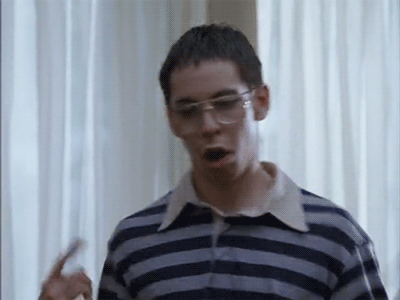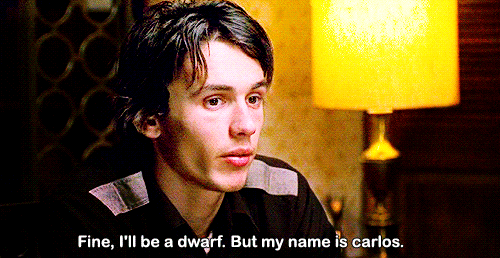Happy Friday, folks!
I would like to begin by extending a sincere thank you to new subscribers. Your support never goes unnoticed. I danced a jig this morning in celebration!

I love reading good stuff. So do you. After all, good stuff is…well…good!
But readers are intuitive creatures. Sometimes we pick up a book, read a couple of pages, and instantly determine that it isn’t for us. The range of reasons as for why we are sometimes quick to abandon a book is broad. Did we detect something off about the author’s writing style? Was the beginning of the story too confusing to grasp? Did the blatant vulgarity rub us the wrong way? Allow me to share what turns me off when it comes to books. Then, I’d love to hear what ruins your reading experience.
Poor Dialogue
For me, poor dialogue is a deal-breaker. Take a gander at some of my favorite movies…
- In Bruges
- Django Unchained
- The Road to El Dorado (yes, the animated movie. I say that proudly).
- The Boondock Saints
- Good Will Hunting
- Casino Royale
- Reservoir Dogs
- Whiplash
Throw in House M.D. and Freaks and Geeks on the TV side of things and you can probably guess that I love when characters talk. But more importantly, I love when characters talk well. I appreciate wit. I appreciate chemistry in conversation. I appreciate natural speech.
Now don’t get me wrong. I have no issue with dialogue that isn’t flashy. Neither Man of Steel nor Avatar, two films I have watched many times over, boast dialogue that is particularly profound or clever.
*cue transition to books*
But I cannot stomach dialogue that is wrong. If I read something and think, people don’t talk like that, I won’t bother reading on. Sorry. Flow in dialogue is essential for me. Directly addressing somebody by name in every line is a no-no. Shoehorning exposition into conversations where exposition does not belong is a no-no. Forced banter is a no-no. If I read a passage of dialogue aloud and it does not sound human, I can’t go on.
Fellow writers: Let’s be mindful of the words we put in our characters’ mouths. We owe it to the readers.
Ridiculous Character Names in Fantasy and Sci-Fi
After I publish my novel, somebody somewhere is going to find this post and call me out for being a hypocrite. Ladies and gents, you could hardly imagine what names I have given to some of my characters. And you could hardly imagine what names I have on a list waiting to be given to characters. I would give you a glimpse, but you would scoff. Scoff! *read as Josh Peck.*
If somebody were to find this post and call me out for attributing preposterous names to my characters, I would point them to the header, which reads “Ridiculous Character Names in Fantasy and Sci-Fi.”
“J.J., how could you discriminate against my genre?!”
Fear not, troubled voice. Fantasy is magnificent and sci-fi provides for great storytelling. But this particular qualm lies exclusively with these two types of story. Often times the names of the characters in these invented worlds are absurd, octo-syllabic derivatives of Latin inspired by Yiddish and rooted in Tolkien’s Elvish. I can’t bear it. My ability to connect with the world is diminished immediately. How could I possibly get on board with a story if every character has a name that hardly sounds human? If an antagonist’s name is riddled with ‘x’s and ‘q’s, I won’t be able to take the guy seriously.
Fantasy and sci-fi genres give a whole lot of mobility to the author. World-building is often involved. However, if the author goes overboard and abuses the mobility of crafting a world via absurd character names, there’s a good chance I won’t get into the story. If I can’t pronounce most names in a novel, the book has lost its shot with me.
A drill sergeant assigning stereotypical or otherwise demeaning nicknames to new recruits? That’s to be expected. A school bully deeming a nerd, “Booger Face?” No surprise there. The head of an elite shadowy rogue spec-ops team referring to his squad-members by cutthroat names such as “Grouch,” “Blitz,” and “Frosty?” It comes with the territory. But fantasy names that seem to come straight from the blender are just too cheesy for me to stomach.
Granted, my own western-novel-in-the-works contains a handful of monikers that will make you think twice. A man named Parsley? That is strange, no doubt about it. But it’s better than Paerzsleiyy, I think.

A Confusing Introduction
Discombobulating a reader is okay. I recall frantically flipping from page to page at a certain point during Robert Jordan’s Great Hunt when I caught myself reading a passage I had just read. I was so confused. I thought the repetition was a misprint! But then I read the thing through and, alas…it turns out that Rand was suffering from a recurring vision (Surprise!). Jordan literally copy-pasted an entire passage a couple times over. By the end of the sequence, I was highly intrigued.
Beginning a story with a stunt like that, however, would be unacceptable. I don’t mind if the first pages I read are laced with mystery or full of unanswered questions. I don’t think the beginning of a story should necessarily “be” any type of way. But I know that the start of a novel should not confuse me to the point where I can’t grasp anything.
I recall Incarceron by Catherine Fisher having a scrambled introduction. I put the book down for a year because I was lost from the start. Eventually, because the book was gifted to me, I returned to it, powered through the beginning, and found favor with the thing. Still, had that introduction been clearer, I wouldn’t have waited a year to pick it up again.
Confusion and intrigue are two very different things. Intrigue me first, confuse me later, if you fancy.

Those are just a handful of personal deal-breakers when it comes to reading. I’d like to hear your take. Do any of the offenses above pain you? What are some things that ruin your reading experience? Sound off in the comments below. I am genuinely interested in hearing what you brilliant people have to say.
As always, stay classy.
~J.J. Azar
Forced/contrived dialogue is certainly an issue of mine, but I hate too when the author rushes certain things in their narrative. Romance is a good example – I don’t mean romance novels, I mean romance between the protagonist and someone else in a very very NOT romance novel. It’s like the author doesn’t think it’s essential to the story, or perhaps not exciting enough, to delve into their characters’ thoughts and emotions. OR those emotions come unnaturally fast and it is illogical. I also dislike crappy writing in general that feels rushed. Using the following words too much or poorly drives me nuts: just, so, now.
All three of these complaints are about the last book I read though, haha. I’m sure my complaints would be different if I had read something else recently.
LikeLiked by 2 people
“Contrived” is the word I was looking for! Yes, CONTRIVED dialogue is the worst.
Romance rushed to the point where it seems implied that a male and a female character are going to end up in some sort of relationship is simply cheap.
And the word ‘just’ drives me crazy as well.
My intention with this post wasn’t to rant about poor writing for fun (okay maybe a little) but to glean insight as to what I ought to be aware of while writing. I definitely want to be sure my dialogue is polished, my relationships develop naturally, and my redundancies are limited.
Thank you for your insight!
LikeLiked by 1 person
I would watch out for sentence variety. You don’t want a lot of the same kind of sentences back to back and you don’t want to over use contractions, simple phrases, or adverbs. It is something I notice subconsciously as “good” or “bad” when it comes to the over all flow of the writing.
LikeLiked by 1 person
I appreciate the pointers! When my first draft is complete, I will be sure to share the total number times I used the word ‘eye’ and its variants. Truly frightening, but alas, that is what a first draft is for. Upon editing, I’ll be scouting out needless repetition in both style and word choice and slaying it promptly.
LikeLike
Thanks for sharing, and I know what you mean about dialogue. I’m always trying to make my dialogue sound realistic, but sometimes it does get hard.
LikeLike
All we can do is work at it, Akaluv! Reciting the dialogue aloud, giving it to others to read, and looking at it with fresh eyes is key! Thanks for stopping by.
LikeLiked by 1 person
I know, thanks for the advice!
LikeLiked by 1 person
I’m glad that dialogue is number 1, but I’m too rooted in fantasy (and too dedicated a D&D player) to agree with you on the character names front. To each their own, but I guess you’ll never be able to stomach reading my characters’ backstories!
LikeLiked by 1 person
I’ll read anything you write, Dan! Perhaps I’ll roll an eye or two, but I’ll read it nonetheless! 😉 I enjoy the heck out of Skyrim though. There are always exceptions!
LikeLike
Gather ’round, and I shall tell you the tale of Scalabrius Merchion, the young dragonborn who renamed himself Gorax and became the youngest general in the history of his nation’s army!
LikeLiked by 1 person
Proclaim thy tale to the heavens, ye scribe! And do not forget to recite the high tales of Marinblas Goldyaarn, Chief Protector of Queen Alluhamportia.
This is actually a blast. I may have to change my tune.
LikeLike
Excellent post! I definitely agree admit dialogue- stilted dialogue is an issue so many newbie writers struggle with, especially in fantasy, and for me it’s a massive red flag. Since well known authors do it as well, but I think they do it to sound clever- is not clever, it’s just pretentious and irritating! Hahahaha Latin inspired Yiddish rooted in elvish- what would that even be like?! You’ve got any four different families of languages there!! You’re right- that’d be awful! I do like faintly ridiculous names in fantasy, but that would be too much!! Agree about intrigue vs confusion- my least favourite books of all time are always in the confusing category! Great post!
PS I also love house!!
LikeLiked by 1 person
Thank you for your thoughtful comment! You’re correct in pointing out that dialogue in fantasy is a tricky thing to nail. I mean, with the stakes so high and the tone so serious, the words exchanged by fantasy characters are apt to come across as melodramatic. Robert Jordan is one fantasy author (I sing his praises quite a bit around here) who manages to write fluid dialogue interjected with plenty of heart and humor.
And House is gold, right?! I appreciate the comment and the insight.
LikeLiked by 1 person
You’re welcome! Haha yes- also fantasy authors also feel need to date their language, so in an attempt to make it sound old fashioned it can often wrong! Definitely!
LikeLiked by 1 person
Exactly! Subtlety is key, I think. Inventing new words and phrases is fine and even expected, but integrating them subtly is what will sell them to the reader. At least, that’s what I need to invest in a fantasy novel! As long as I have something real to latch onto, I’m in.
LikeLiked by 2 people
Yes definitely!
LikeLiked by 2 people
This is a really great post.😀
LikeLiked by 1 person
Thank you, Drew!
LikeLiked by 1 person
Ooh Django! I love that film. “I think… we all agree… the bags was a nice idea. But – not pointing no fingers! – they coulda been done better.” X-D
One thing that has the potential to stop me reading – but often doesn’t because I will really force my way through a book – is two-dimensional characters who all talk the same and don’t inspire any sympathy. Characters like this usually end up being very unlikeable as well.
I’m also quite plot-driven with my reading, so if I feel a plot is non-existent or it’s a good plot but the writer hasn’t executed it well, I’ll probably DNF that book.
LikeLiked by 2 people
Django is a film I’ll be watching when I’m 80. That bag scene is gold. I simply can’t sing its praises enough. And let’s not forget, “Now gentlemen, if you care to join me in the parlor, we will be serving HWite cake.”
2-D characters are a real problem which ruin stories for me as well. In my writing, I make a conscious effort to differentiate the mannerisms, speech, ambitions, and opinions of all of the characters. It’s difficult, but it’s a writer’s job to sell his or her world and characters!
A meandering plot can certain be a hindrance. Pace and plot are not as tangible as characters, so I understand the trouble with it, but again, we need to get it right! 😀 Thank you for stopping by and deciding to stick around.
LikeLiked by 1 person
Oh I think plot is the most important. Yes, you need good characters, but if there’s no plot then what are the characters there for? You’re welcome!
LikeLiked by 1 person
I think what most pulls me out of a story is when the writing is too direct with its meaning. I recently read a book where the prose repeatedly said, in no uncertain terms, that a character was sad, shy, or angry, and never offered any details or actions that implied or reinforced those statements. Similarly, many of the scenes felt monolithic, focused on a single issue or conflict, without any side-plots or hints of the world beyond the scope of the scene.
LikeLiked by 2 people
Great point, Adam! Writing needs room to breathe, right? There’s a certain faith a writer has to impart upon the reader. Force-feeding a particular point in every chapter will not make for a positive or thought-provoking read.
LikeLiked by 2 people
I saw Whiplash only relatively recently. My primary interest in it was the music angle.
LikeLiked by 2 people
I love that movie. What did you think of the music?
LikeLiked by 2 people
Reminds me of my kids’ Jazz Band at school.
LikeLiked by 2 people